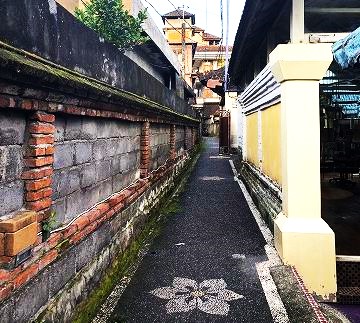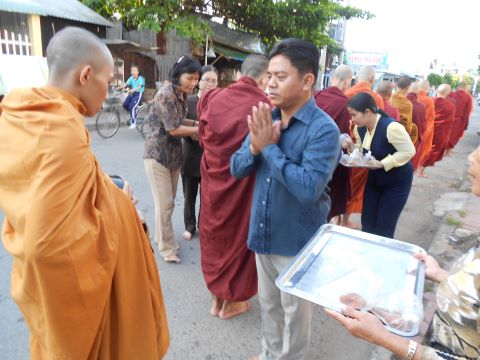
Increasing concentration means concentrating activity in one part of the brain and decreasing activity in other parts. In other words, it means directing your attention completely to an object.
This is “sati” in Pali.
So, what should we do to further increase this “sati”?
Improving daily life or be healed
“Practice meditation”
We should see it as one of our daily activities. In other words, you should have consistent morals in your daily actions.
It’s not that difficult.
For example, the following 5 matters.
1 Panatipata veramani sikkhapadam samadiyami
Do not take the lives of living things
2 Adinnadana veramani sikkhapadam samadiyami
Don’t take other people’s things
3 Kamesmiccacara veramani sikkhapadam samadiyami
Do not commit adultery
4 Musavada veramani sikkhapadam samadiyami
Don’t use lies, backbiting, dirty talk, or duplicity
5 Suramerayamajja pamadatthana veramani sikkhapadam samadiyami
Do not consume alcohol, drugs.
At a minimum, you should always adhere to these five morals in your daily life.
If you follow other religions, such as Catholicism or Islam, you probably know similar commandments from the Bible and Al-Quran. Almost all classical religions have similar precepts. Therefore, the meditation method explained here is based on the fundamental human way of life, including the precepts, and is not an approach that limits any religion or non-religion.
If you want to raise your awareness further, you should add the following three morals.
6 Vikalabhojana veramani sikkhapadam samadiyami
Do not eat in the afternoon
7 Nacca-gita-vadita-visukkadassana mala-gandha-vilepana-dharana-mandana-vibhusanathana veramani sikkhapadam samadiyami
Stay away from dancing, singing, music, theater (movies, dramas, plays), accessories, perfumes/cosmetics, and body beauty
8 Uccasayana-mahasayana veramani sikkhapadam samadiyami
Avoid luxurious beds and comfortable chairs
By maintaining these morals, you will be able to solidify the foundation for improving your concentration. This is the first step to improving concentration and reducing delusions, which are the enemy of meditation.

Why do “delusions” occur?
The root cause of delusions is “information”.
Don’t you want eat tropical fruits ?
Our brain has a function called “memory”, and it plays a very important role in the survival of any living organism. Therefore, when the mind (brain) calms down and is freed from judging and thinking about the current situation, the brain performs tasks such as sorting out past information and making choices. In other words, this is the case with dreams that we have while sleeping.
However, the brain functions differently during meditation and while sleeping. When we dream while we are sleeping, we cannot control what happens with our own consciousness. On the other hand, delusions during meditation allow you to create your own scenarios and let the drama unfold, so you can become absorbed in them.
The cast, setting, location, and environment that emerge in these delusions all come from “everyday information.”
For example, if you are involved in a job related to smells, you are bound to have delusions and dreams about those smells. Or, if you work in IT, you may have dreams or delusions where you see scenes on the monitor, or where you wake up in the morning and open your mailbox in the garden to find an new incident or an e-mail.
However,
You’re walking in a foreign land you don’t know, and you’re talking to someone in a foreign language you don’t know. If such a scene appears in a dream or delusion, that is a different story.
Let’s talk about that sometime.

Capture only one point. The sixth option, “avoiding afternoon meals,” originally applies to monks who have become monks, but in meditation centers in countries such as Thailand and Myanmar, yogis are also not served dinner.
This may be difficult for ordinary people with jobs, but it can be managed with some ingenuity.
For example, you only eat yogurt and fruit around 4pm. However, do not consume oil, grains, meat, or fish. Or drink fresh juices, vegetable juices, etc. Consume foods that are low in calories and have a low burden on the stomach and intestines.
The purpose of this moral is to free yourself from your obsession with dinner and focus on your afternoon meditation. In terms of positive side effects, the digestive activity of the intestines is completed before bedtime, and the gastrointestinal tract is rested while sleeping, which reduces physical exhaustion and aids in dieting.

From ancient times to the present, ordained primitive Buddhist bhikkhus (in Myanmar, Thailand, Cambodia, Sri Lanka, etc.) go to alms in the morning. In Yangon, Myanmar, alms, which also serves as a social service, is held at 4 a.m. by all members of the temple. A portion of the rice and side dishes collected will be donated to children in poverty-stricken areas. Also, around 10am, each bhikkhu goes to the donor’s house to offer alms. However, alms are not given in the afternoon.


